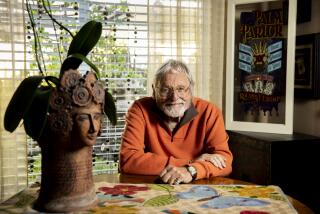A Ford fiesta
- Share via
The late Glenn Ford’s 8,800-square-foot Beverly Hills mansion has a curious octagon shape that had just one official bedroom -- a huge master bedroom on the main floor.
“There are very few right angles in this house,” said his only child, 66-year-old Peter Ford, who has lived there with his wife, Lynda, for the last 17 years. They moved in 12 years before Ford’s death in 2006 at age 90 to take care of the ailing actor.
“The reason was, he didn’t want to be fenced in. This house is kind of a metaphor for his life. He had wanderlust. He needed to do this thing.”
Peter Ford will appear Saturday at the American Cinematheque’s Egyptian Theatre to talk about his dad, sign copies of his new biography, “Glenn Ford: A Life,” and screen two of his film noirs: 1947’s “Framed” and 1949’s “Mr. Soft Touch.”
Ford admitted he is a bit concerned how his father’s fan base will react to the autobiography. The book, though not a “Daddy Dearest,” paints a less-than-flattering picture of the legendary actor. Ford discusses with great admiration his father’s film career that included such classics as 1955’s “Blackboard Jungle,” 1946’s “Gilda,” the second of his five films with Rita Hayworth, and Fritz Lang’s seminal 1953 film noir “The Big Heat.”
But he also doesn’t pull any punches about his father’s chronic womanizing -- Hayworth, Joan Crawford, Hope Lange, Geraldine Brooks, Maria Schell, Judy Garland and Brigitte Bardot were among his lovers -- his drinking and his often strained relationship with Peter.
Perhaps one of the most shocking revelations is that Ford and Hayworth became lovers during 1948’s “The Loves of Carmen,” and in fact, Hayworth became pregnant with Ford’s child and had an abortion at a hospital in France. “Nobody knows that,” he said. “I have his diaries.”
“The image of my dad is that he is like Jimmy Stewart, an Everyman. He was that on film. He wasn’t that in private life,” said Ford, whose mother was Ford’s first wife, tap-dancing legend Eleanor Powell, whom he describes as a “saint.” Powell was married to the actor for 16 turbulent years. He began the book the year before his father died.
“We worked on it together,” Ford said. After his father’s death he also was able to quote from Glenn Ford’s extensive diaries, which he began writing in 1934, plus many audio tapes he made.
Though being Ford’s son was difficult, he admires his father’s talent. “To me, he’s one of the greatest actors and one of the most underacknowledged ones.”
Ford believes that his father is underappreciated because he was under contract for years at Columbia Pictures. Studio chief Harry Cohn put Ford in “B” pictures early in his career and then promised him such films as “From Here to Eternity,” only to renege on his promise.
His father played it safe by staying at Columbia for more than 14 years. “He was very insecure about money,” he said. “He would rather stick with Harry. And in a nutshell, he never had the chance to work with quality directors other than Fritz Lang and Delmar Daves. There were no Howard Hawks, George Cukors there.”
Of course, Ford made unwise decisions, such as turning down the role of Joe Gillis in Billy Wilder’s “Sunset Blvd.” Peter Ford said his dad was stinging from the failure of “The Loves of Carmen,” in which he felt emasculated wearing tights; in “Sunset Blvd.” he would be playing a kept man to an aging silent-screen star. “So he looks at the role in ‘Sunset Blvd.’ and reads the script and he said, ‘Here I go again. I am going to be an also-ran.’ ”
Ford’s career changed dramatically when he went to MGM in 1954 and made Richard Brooks’ hard-hitting “Blackboard Jungle.” The late 1950s were golden for Ford -- after “Blackboard Jungle,” he earned strong notices for “Trial,” “Jubal,” “3:10 to Yuma,” “The Teahouse of the August Moon” and “Imitation General.” In 1958, he was the No. 1 box office star in the U.S.
Peter Ford believes that because his father gave himself so much to his craft, “I don’t think he had anything left for his wife and son. He loved acting, and unlike my mom, who stopped, he kept going to the bitter end. The end of his career was like the beginning, doing all of these horrible, less-than-laudatory films. But he loved acting, and they paid him big money. When he came home it was like Jekyll and Hyde.”
--
--
BEGIN TEXT OF INFOBOX
Glenn Ford in the driver’s seat
The versatile actor played romantic, leading-man roles, gritty dramas and comedies.
‘Gilda’
Ford became a full-fledged star in this 1946 romantic noir that reteamed him with Rita Hayworth. He played small-time gambler Johnny Farrell in Buenos Aires who has a love-hate relationship with his former gal pal, Gilda.
‘Blackboard Jungle’
Ford received glowing reviews for Richard Brooks’ gritty 1955 drama about teachers at an inner-city New York high school. Ford stars as Richard Dadier, a teacher at the school who tries in vain to challenge his rough-and-tumble students.
‘The Teahouse of the August Moon’
Ford got the opportunity to show his comedic side in this popular 1956 comedy based on the award-winning play about the U.S. occupation of Japan after the war. Ford plays Capt. Fisby, who is sent to Americanize a village.
----
Glenn Ford double feature
Where: American Cinematheque Egyptian Theatre, 6712 Hollywood Blvd., Hollywood
When: Saturday, Peter Ford will sign books at 6:30 p.m.; the program begins at 7:30
Price: $11
Contact: www.americancinematheque.com
More to Read
The biggest entertainment stories
Get our big stories about Hollywood, film, television, music, arts, culture and more right in your inbox as soon as they publish.
You may occasionally receive promotional content from the Los Angeles Times.











